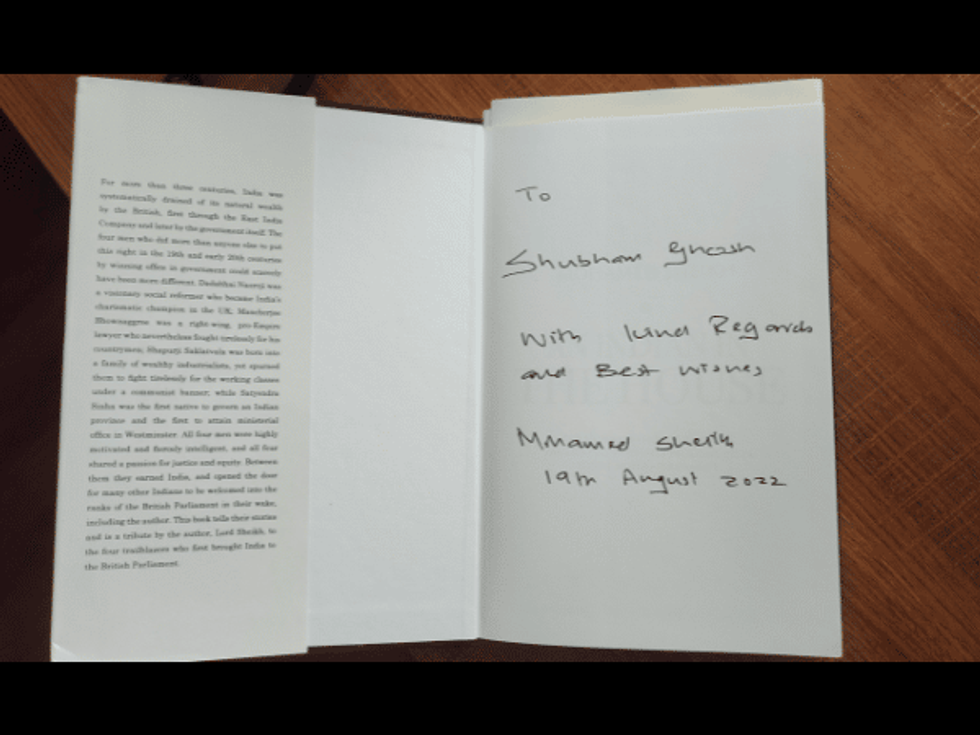THE news was more than shocking. It was only on August 18 that I took an interview of Lord Mohamed Sheikh, Britain’s first Conservative Muslim peer and a successful businessman, as he was picked as one of the '50 Great Ugandan Asians' on the occasion of the 50th anniversary of the expulsion of the community by former dictator Idi Amin. We were in contact post that hour-long talk also as the veteran was interested to know how the interview would come out in writing and politely shared his feedback over the draft.
It leaves me in a sea of sadness that the man would not be able to see the final interview.
During our August conversation, we often deviated from the interview’s core emphasis and delved deep into Indian affairs, particularly its history, and Lord Sheikh was so pleased with the exchanges that he ended up gifting me a hardcopy of his 2019 book An Indian in The House: The lives and times of the four trailblazers who first brought India to the British Parliament signed by him.

And soon after I got to collect that treasured possession, the news came that Lord Sheikh was no more. The shock was immense not only because I had just taken an interview of him, but also because the 81-year-old was ever active in playing diverse roles – as a politician, businessman, academic, writer and most importantly, a humanitarian.
During my conversation with Lord Sheikh which turned out to be an once-in-a-lifetime affair, I could certainly fathom certain qualities in the man that undoubtedly helped me to make it big. He spoke words that were filled with determination. The towering individual I spoke to was not somebody in his 40s, 50s or 60s but in the 80s but yet the confidence in his voice proved why he was an achiever.
“Amin could take our properties and processions but not our brains,” the lord famously said. “Ugandan Asians have historically done well in every walk of life. Since they succeeded well in Uganda, there was no doubt that they would do the same in the UK, a land of opportunities,” he added.
Lord Sheikh was also a man of heart and principle. He did not hesitate to give credit to his father for those qualities.
“My father had told us to be best in whatever we did and to do ‘seva’ (service) to the community,” he said. The late peer also had a secular worldview and it was again the values that he received in the family during his growing years that shaped that personality in him. As the president of the Indian association in Uganda, his father went to gurdwaras and temples with his family. Lord Sheikh himself was also the president of a Sikh association and he told me that India as a nation has always seen a harmony of people, something that he always cherished during his stay in Uganda where communal peace was as robust.

Lord Sheikh’s repeated emphasis on his Indian roots spoke volumes about the love that he harboured for his heritage. The man was truly a global citizen since he spoke highly about each nation that he connected with during his lifetime – Uganda (Africa), UK (Europe) and India (Asia).
“This country (UK) has been good to us and as hard-working people, we grabbed the opportunities that came our way,” he told me during the interview.
It may be mentioned here that while Lord Sheikh was born in Kenya and spent his younger days in Uganda and went to the UK for study before the 1972 expulsions happened, his family originated from Punjab. His first book (2017) was on Maharaja Ranjit Singh, one of the most powerful 19th century Sikh emperors from India.
Lord Sheikh did not forget to pay favours back either. One of the reasons for him to join the British Conservative Party is that it was a Conservative prime minister in Edward Heath and his home secretary Robert Carr who faced challenges to welcome the Ugandan Asians in the UK after they were thrown out from Uganda.
To recall one incident during the conversation, the lord looked dejected when I gave him a fact about one of the four Indian characters that he covered in his 2019 book – Lord Satyendra Sinha. As we spoke about Lord Sinha, a big 19th century name from colonial India to make it to the British ministry, I told the peer that Lord Sinha’s paternal house in Raipur in the eastern Indian state of West Bengal lies in ruins today where people shoot horror films. “That’s a pity,” he said, adding that he would try to speak to some authority on that matter.
That task remained incomplete.
Lord Sheikh was also enthusiastic to discuss historical affairs when he came to know that the interviewer was a Bengali. He spoke about Rabindranath Tagore; Bengali surnames such as Chatterjee and Banerjee; and in detail, the Battle of Plassey of 1757 where the last sun of independent India had set.
That the man was ever hungry to know things was evident whenever I gave him slight pieces of information, like there is a memorial now at Plassey where the British army of Robert Clive had defeated Shiraj-ud-daulah, the nawab of Bengal and the fleeing Indian king after the battle was, as the legend goes, identified by his shoes and executed. "India has such a fascinating history," he said.
I even shared pictures of Lord Sinha’s dilapidated house and the memorial at Plassey with Lord Sheikh as he was eager to see them. “Really!” reacted the enthusiastic student in Lord Sheikh when I let him know that the Tagore family had bought the land where their world-famous Santiniketan ashram stands today, from the Sinhas -- who were local landlords -- for a token rupee one around the mid-19th century.
A truly global personality indeed.
Towards the end of the interview, Lord Sheikh also remembered Ramniklal Solanki CBE, the founder of Asian Media Group, and a giant of Gujarati journalism. “He was one of the nicest persons I ever met, a very humble man,” he said, also adding that the chief whip had advised him to meet the senior Solanki after he became a member of the House of Lords and he enjoyed every minute of the meeting.
“He did extremely well and his sons are doing as well.”
Lord Sheikh had said that in 1972, Amin’s loss was the UK’s gain. On September 22, the UK also witnessed a major loss in his death. It is not easy to find somebody of the man’s stature who was truly one with multiple faculties.
Rest in peace sir. You will be missed.






 Apsana Begum
Apsana Begum











